by Prof. Wenxian Zhang, Head of Archives and Special Collections
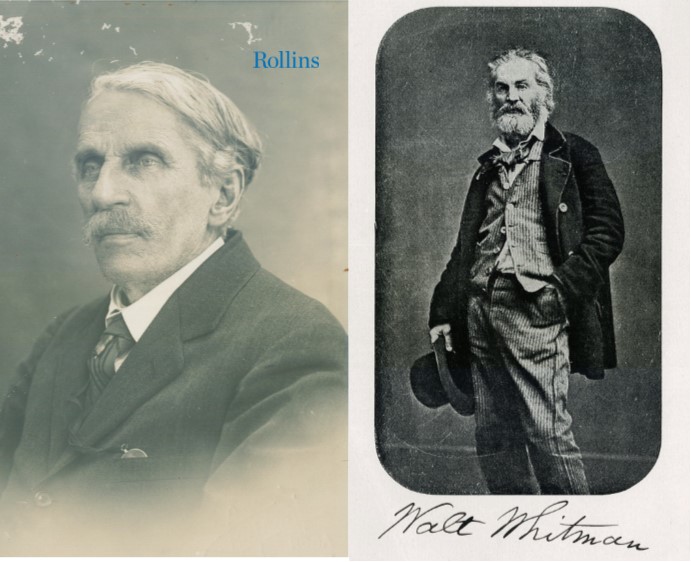
Known as “one of Whitman’s most devoted friends and admirers,” William Sloane Kennedy was a journalist, literary critic, editor, and biographer.[1] Born on September 26, 1850, to Rev. William Sloane Kennedy and Sarah Eliza Woodruff in Brecksville, Ohio, Kennedy grew up in Oxford, Ohio. He first attended Miami University, then transferred to Yale University, where he graduated in 1875. Kennedy later attended Harvard Divinity School; however, instead of becoming a Presbyterian minister like his father, he soon left Harvard and joined The American in Philadelphia to pursue a career as a journalist and literary figure. After his stint with The American, he worked for the Boston Transcript, and became a special contributor to the New York Critic, the Boston Herald, the Boston Index, and the Literary World. A prolific writer, Kennedy published biographies of Henry W. Longfellow, John G. Whittier and Oliver W. Holmes, studies of John Ruskin and John Burroughs, anthologies of his own poetry Breezes from the Field (1886) and Poems of the Weird and the Mystical (1926), and a collection of nature essays, In Portia’s Gardens (1897). In addition to numerous articles in newspapers and journals, he also published Wonders of Curiosities of the Railway (1884) and offered his critique of Mussolini in Italy in Chains: A Nation under the Microscope (1927). His most important contributions, however, were his studies of Whitman, including Reminiscences of Walt Whitman (1896), Walt Whitman’s Diary in Canada (1904), and The Fight of a Book for the World (1926), which represent some of “the most intelligent and illuminating early studies of Whitman.”[2]
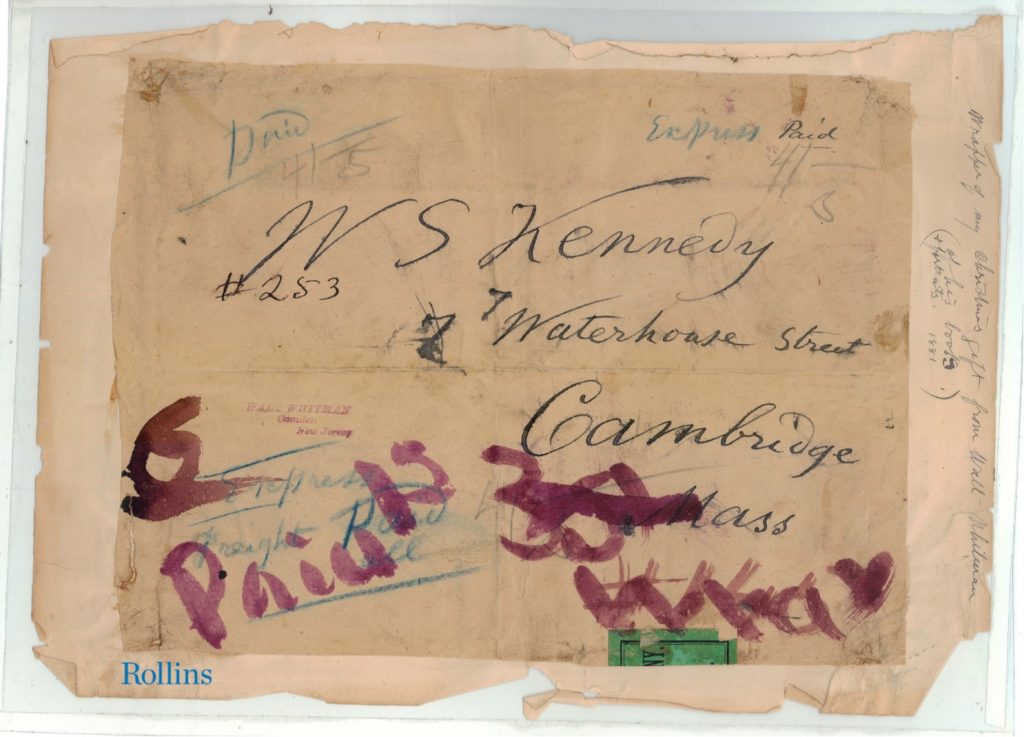
Kennedy first met Whitman in the City of Brotherly Love in 1880, while on the staff at The American and began his devotion for the renowned lyricist that led to many visits to Camden, New Jersey.[3] Describing his bond with Whitman, Kennedy later noted he was “being possessed by a strange and inwardly fiery feeling and love for the man, which I never felt for any other.”[4] Kennedy’s first writing on Whitman appeared in the February 1881 issue of The Californian, in which he praised the American poet as “the most remarkable literary phenomenon of the age,” and Whitman’s work as “mixed of iron and gold.”[5] According to Kennedy, after sending his ten-page essay to Whitman, “He read it and was impressed with it and sent me a Christmas present of his book. I was charmed by his kindness and became from that moment a devoted disciple till his death.”[6] Kennedy received a letter from Whitman on February 25, 1881, and from that point on their friendship lasted until Whitman’s death in 1892, resulting in over two hundred letters and postcards from Whitman to Kennedy.[7] “They are off-hand jottings, bits of conversation on paper, set down when the mood seized him,” Kennedy wrote. “Whitman’s letters, while not of the old, elaborate, epistolary style, and perfectly natural and unstudied, are yet informed with a brave, cheery spirit, and irradiated often with humor, and full of nuggety bits that will well bear printing in excerpts.”[8]
As a disciple and one of the most ardent supporters of Whitman, Kennedy’s affection for Whitman and his work is legendary. In his bristly essay, “Euphrasy and Rue for T. W. Higginson,” Kennedy fiercely criticized not only Whitman’s antagonist Thomas Higginson, but also some of Whitman’s close friends, such as William Douglas O’Connor and Horace Traubel.[9] During the last decade of his life, Whitman regularly corresponded with Kennedy, noting, “For Kennedy I have gradually realized an affection, a real, deep, enduring affection.”[10] While Whitman wrote about his work, health, meals, weather, and publication plans, Kennedy’s responses were filled with tributes and admiration, calling the American poet “a grand old god, with all your faults–,” “ . . . the only god I at present worship apart from the Universe as a whole.”[11]
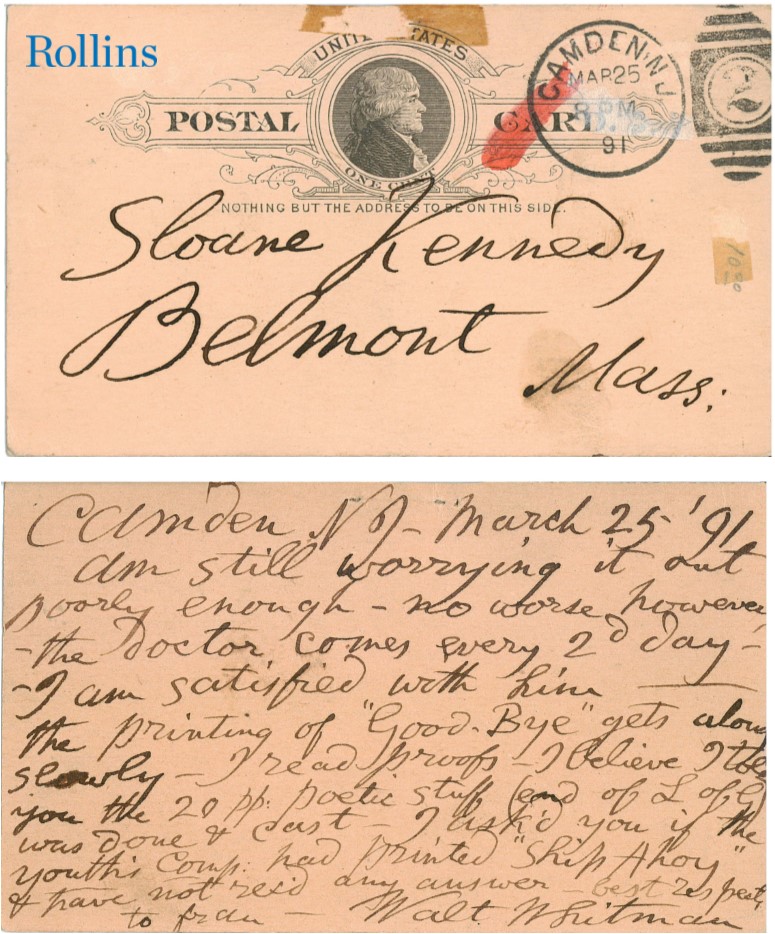
Although Kennedy lost his original manuscript of Whitman scholarship while traveling in Europe, he was determined to produce a “curious anecdotal and literary history of the book [Leaves of Grass] and its ‘varying fortune, with flight, advance and retreat, victory deferr’d and wavering,’ up to the point of Whitman’s death and his work’s triumphant success.”[12] In 1896, four years after the death of Whitman, Kennedy published his Reminiscences of Walt Whitman, with Extracts from His Letters and Remarks on His Writings. He continued his work with Walt Whitman’s Diary in Canada in 1904, but his monumental accomplishment was The Fight of a Book for the World: A Companion Volume to Leaves of Grass in 1926. According to Edwin Markham, Poet Laureate of Oregon, “This book is exciting reading, as it takes up battles of the past, as well as the present. Not Walt himself has a more picturesque vocabulary than this knight Kennedy, skewering a Whitman adversary. No one hereafter can write of Whitman without reckoning with this Kennedy report of apotheosis and anathema, its show-down of friends and foes.”[13]
During the later years of his life, Kennedy escaped the northern winters in Winter Park, Florida, where he met and befriended Edwin O. Grover (1870-1965), Professor of Books at Rollins College. Before his unfortunate drowning on Cape Cod on August 4, 1929, Kennedy spent his last two winters in Central Florida and presented a copy of his book to Edwin Grover. As the last intimate friend of Whitman, Kennedy was persuaded by Grover to leave a legacy to memorialize his friendship with the famed American poet by donating his personal collection and establishing an endowment fund for Whitman materials at Rollins. After Kennedy passed away, his bequest of $10,000 provided sustained funding for the College Library to buy books by and about Walt Whitman.
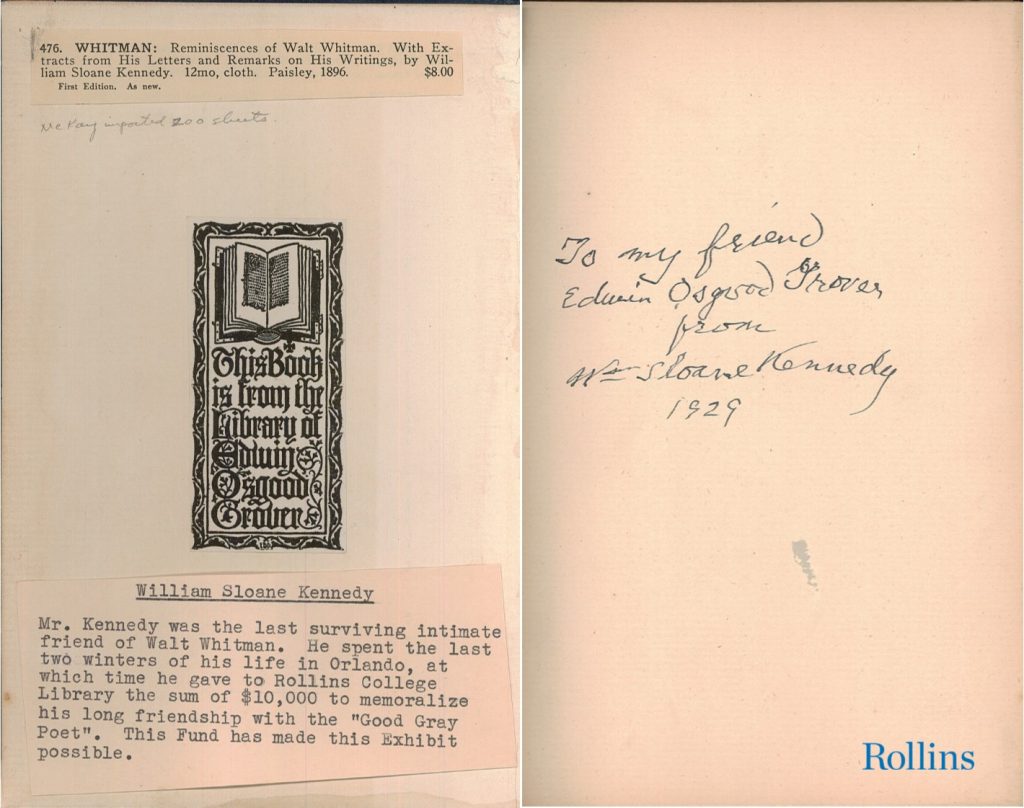
which was donated to Rollins College Library by Grover in 1960.
As a loyal friend of Kennedy, Grover appointed himself steward of the memorial fund and faithfully watched over the endowment to make certain that it could only be used for materials related to Whitman scholarship. During the Great Depression of the 1930s, when the College experienced severe financial difficulties, Library Director William Yust desperately tried to divert some funds to support the newly revised curriculum under President Hamilton Holt. However, Grover stood steadfast in fending off various attempts made by faculty and administrators, including obtaining a legal interpretation of Kennedy’s will by a judge in New York.[14] A decade later, College Librarian Joseph Ibbotson launched another challenge when Duke University Library established its Whitman Collection, and President Holt had to weigh in and rule that the Kennedy Fund could only be used for Whitman acquisitions.[15]
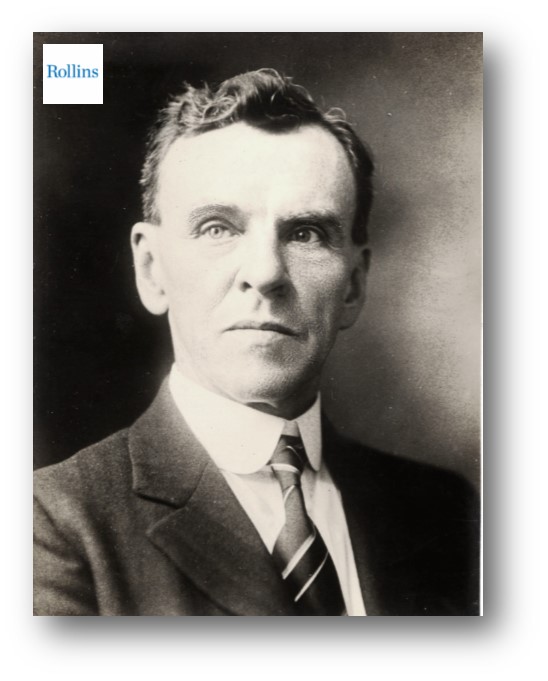
and later served as Library Director and Vice President of the College.
Without Grover’s dedicated efforts, the William Sloane Kennedy Memorial Collection of Whitmaniana would not have grown beyond the original gift. Since 1930, Rollins has been actively acquiring scholarly publications on the lives and literatures of both Whitman and Kennedy. From his original library of 65 books, the collection has grown to include numerous books in the College Library, including 1,251 titles in Special Collections, unpublished dissertations, Kennedy’s own journals and scrapbooks, archival manuscripts, photographs, and other primary source materials. The Kennedy Memorial Collection at Olin Library has since become one of the most comprehensive repositories of Whitman scholarship to be found anywhere, not only used by Rollins students and faculty members, but also by Whitman scholars and researchers across the country.
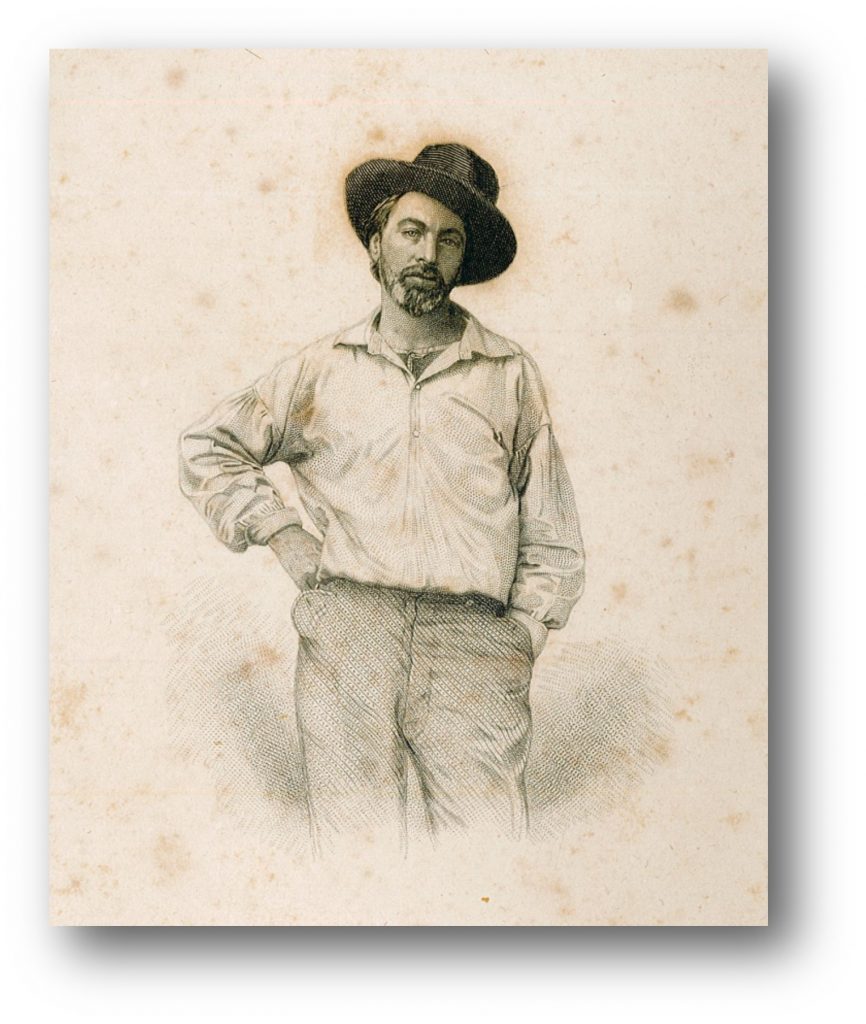
William Sloane Kennedy Memorial Collection of Whitmaniana at Rollins College.
Notable among the William Sloane Kennedy Memorial Collection is a rare, first edition of Leaves of Grass, which came to market in 1935 after novelist Katherine Holland Brown passed away in Orlando. Originally valued at $2,000, Rollins finally acquired it for $500 from Katherine’s cousin Harry Brown in 1945.[16] This is one of the first 200 copies bound up of the first 800 originally set by Whitman himself in 1855, with gold leaf on the front and back covers and marbled inserts. The collection also contains a handwritten postcard from Whitman to Kennedy, and a six-piece manuscript by Walt Whitman, beginning with the words “In my opinion it is the idea of immortality above all other ideas,” in which the literary giant mused upon democracy and immortality.[17] In addition, Rollins also retains the original, handwritten manuscript for Kennedy’s A Fight of a Book for the World, as well as his heavily annotated copy of Specimen Days.
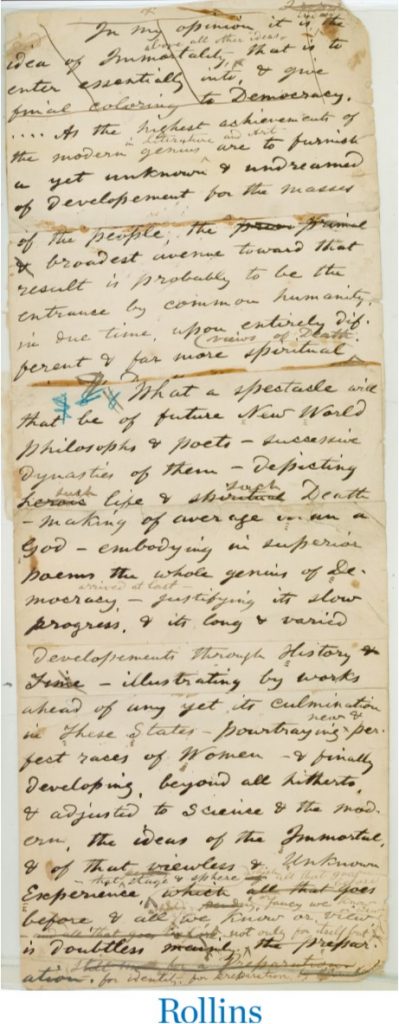
The William Sloane Kennedy Memorial Collection of Whitmaniana was processed and described in 1996 by Kathleen J. Reich, Professor Emerita and Head of Archives and Special Collections at Olin Library, Rollins College. Items from the collection can be seen in the exhibit Ut Pictura Poesis: Walt Whitman and the Poetry of Art, on display at the Cornell Fine Arts Museum through December 29.
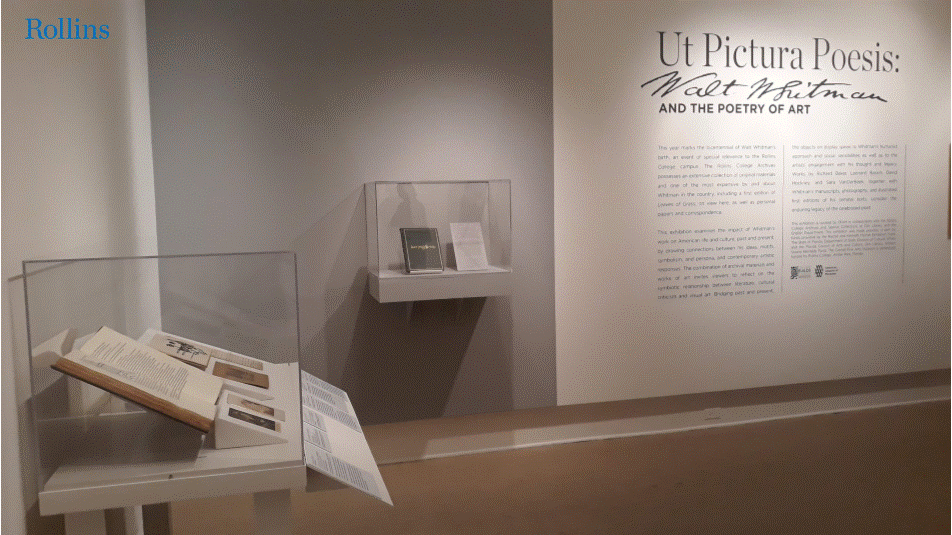
Acknowledgements
The author is grateful for the reviews by Prof. Kate Reich, Prof. Jonathan Harwell, and Mrs. Darla Moore.
[1] Katherine Reagan, “Kennedy, William Sloane (1850-1929)” in J.R. LeMaster and Donald D. Kummings (eds.), Walt Whitman: An Encyclopedia (New York: Garland Publishing, 1998), 339.
[2] Ed Folsom, “Preface,” in Kathleen J. Reich, (ed.), The William Sloane Kennedy Memorial Collection of Whitmaniana (Winter Park, Florida: Olin Library, Rollins College, 1996), v.
[3] Reagan, 339.
[4] William Sloane Kennedy, Correspondence with Edwin Osgood Grover, Rollins College Archives.
[5] William Sloane Kennedy, “A Study of Walt Whitman,” The Californian 3:4 (February 1881), 149-158.
[6] William Sloane Kennedy, Correspondence with Edwin Osgood Grover, Rollins College Archives.
[7] William Sloane Kennedy, “The Friendship of Whitman and Emerson,” Poet-lore 7:2 (February 1895), 71-74.
[8] Ibid.
[9] Robert K. Nelson and Kenneth M. Price, “Debating Manliness: Thomas Wentworth Higginson, William Sloane Kennedy, and the Question of Whitman,” American Literature 73:3 (September 2001), 497-524.
[10] Folsom, vi.
[11] Ibid.
[12] William Sloane Kennedy, Reminiscences of Walt Whitman. London: Alexander Gardner, 1896, vii.
[13] Edwin Markham, Poetry Society of America, October 1927, 6.
[14] Kathleen J. Reich, The William Sloane Kennedy Memorial Collection of Whitmaniana (Winter Park, Florida: Olin Library, Rollins College, 1996), viii.
[15] Ibid.
[16] Ibid.
[17] Walt Whitman, “In my opinion it is the idea of immortality above all other ideas….” handwritten manuscript glued together in 6 places, Treasures at Rollins Archives, Rollins Digital Collections, https://archives.rollins.edu/digital/collection/treasures/id/89/rec/1.
